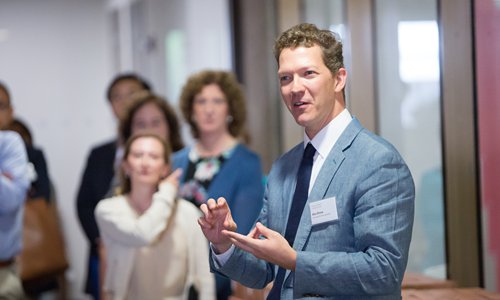HOME >> ARTS
Creating connections
By Chen Xi Source:Global Times Published: 2019/9/25 19:08:40
Tianjin Juilliard School shines light on China-US cultural relations

A rendering of The Tianjin Juilliard School campus Photo: Courtesy of ECADI

Alexander Brose Photo: Courtesy of The Tianjin Juilliard School
Every day, outstanding music students from all over the world gather together at The Juilliard School, well-known as "the Harvard in music," to show their talent and create amazing music in the fast-paced city of New York. Meanwhile, on another continent far away, a similar scene is unfolding on a similar campus in North China's Tianjin Municipality.
"The Tianjin Juilliard School recruited a resident faculty, all of whom are now living in Tianjin, from seven different countries including the US, China, Hungary and South Korea, among others, and we hope that this will attract an international student body as well," Alexander Brose, executive director and CEO of The Tianjin Juilliard School, told the Global Times on Tuesday.
Growing up in Seoul, South Korea and China's Hong Kong Special Administrative Region, Brose said he has long had a strong interest in Asian culture, especially Chinese culture in particular. After helping build a close relationship between the Shanghai Conservatory of Music and San Francisco Conservatory of Music (SFCM) by holding the SFCM-Shanghai International Chamber Music Festival, Brose now is in charge of managing The Tianjin Juilliard School, the first overseas campus of the renowned Juilliard School in New York.
"We aim to build a unique school here in Tianjin, one that will provide additional learning opportunities to aspiring musicians from across the globe," said Brose.
Special curriculum
Different from the curriculum at the New York school, The Tianjin Juilliard School opened a pre-college program for students age 8 to 18 in September. Additionally, the graduate studies program is set to kick off in September, 2020. The graduate studies program, which offers a US-accredited Master's of Music degree, has three majors - Orchestral Studies, Chamber Music and Collaborative Piano.
"We set up the pre-college program because we hope to share ideas that we have at Juilliard to more young students. We hope that in the future they can go to conservatories in China, to exchange ideas that they will learn here," said Ara Guzelimian, dean and provost of The Juilliard School, at a press conference on September 16.
Guzelimian said they carried out a lot of research before choosing the three majors. Their common point is that they all emphasize collaboration between musicians, which is important for symphony orchestras and chamber groups in China.
"People believe that these are in general the weaker areas of many conservatories in the world," Wei He, artistic director and dean of The Tianjin Juilliard School, noted.
He pointed out that China has built a large number of opera houses and trained a large number of opera performers in recent years, but that piano coach for opera actors is highly demanding. For this reason, The Tianjin Juilliard School hopes to focus some effort onto this untapped field.
Brose concluded that the two programs complement current music education in China and they are planning to open more programs including public education and continuing education in the future.
Different talents
In order to inherit Juilliard's musical philosophy, The Tianjin Juilliard School encourages students to head out into the community.
"An artist's responsibility is not only to the stage, but also to society. People who do not normally get connected with art should have the opportunity to approach art and understand art, and so students should become artistic ambassadors," Joseph W. Polisi, chief China officer and president emeritus of The Juilliard School, said at the press conference. The school has plans to conduct activities at surrounding schools, nursing homes or special communities to encourage students to interact with people.
"We don't train students for utilitarian purposes, nor to have them get good scores on their exams, but to allow them become pure musicians. They should be supporters of each other rather than competitors," said Yu Long, chairman of the Tianjin Juilliard Advisory Council, at the conference.
Naturally, cultivating young talented individuals requires a great teaching team.
"The faculty in Tianjin represents the quality of teaching at the New York Juilliard, and the most important thing is that they will bring new musical trends to China. We selected 21 musicians from seven countries to form the inaugural resident faculty of The Tianjin Juilliard School. The campus in New York will send over 30 faculty to Tianjin every year to give lessons to pre-college students and graduate students," said Brose.
"Music connects and unites. Music can be used to communicate when words cannot. We hope our program in Tianjin can serve as a cultural bridge between China, the US and beyond," Brose said.
Regarding China's growing interest in classical music.
"You can feel the energy and dedication of the children who study music here. I believe the potential of the music market in China is huge," he said.
"China has a long history and values long-term perspectives. Similarly, we also look at this project from a long-term perspective, and the 'longevity' of this project in art and education will not be affected by political factors," said Polisi.
"We hope our students can create music that combines elements from various countries. Music does not have a border, and it can connect the world including the US and China," Brose said.
Posted in: MUSIC,CULTURE & LEISURE